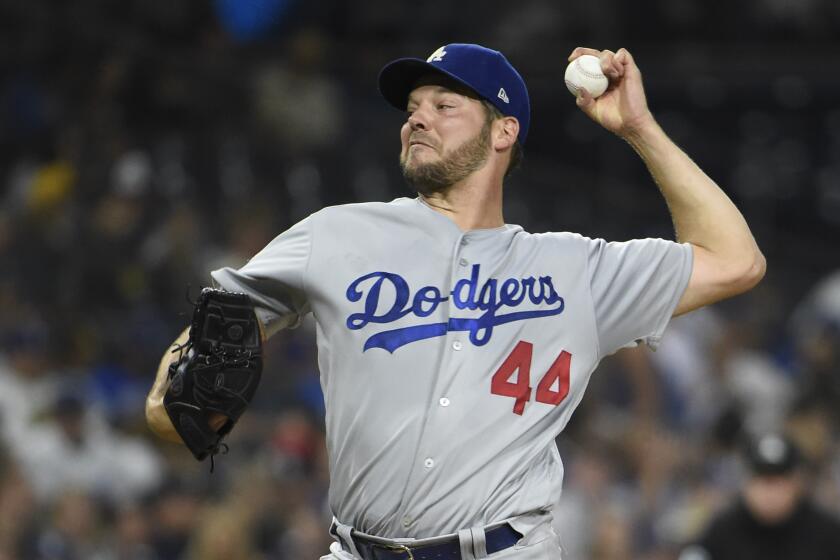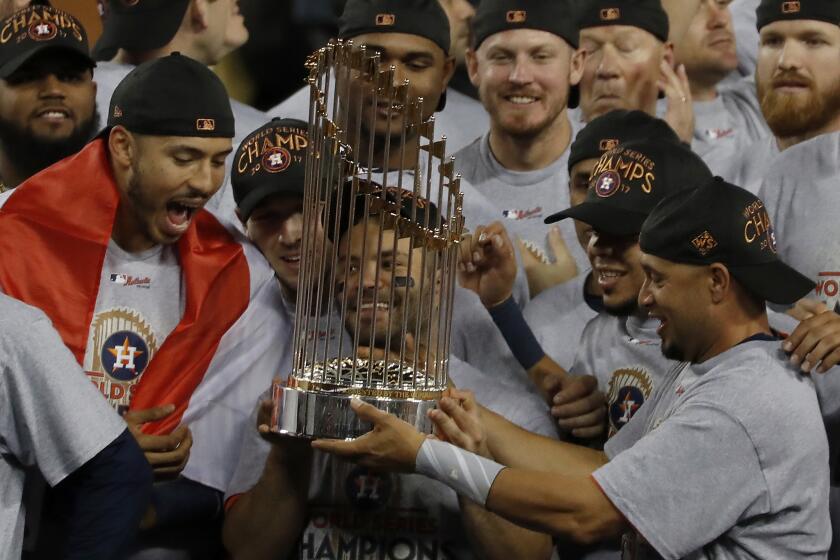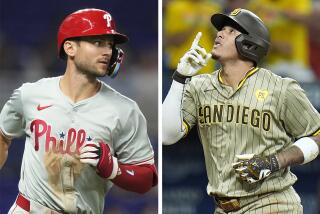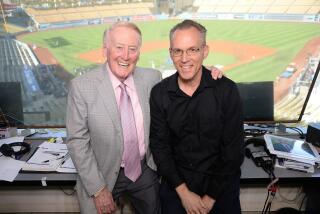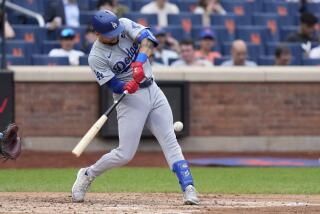Dodgers’ absence of African American players underscores an ongoing MLB issue
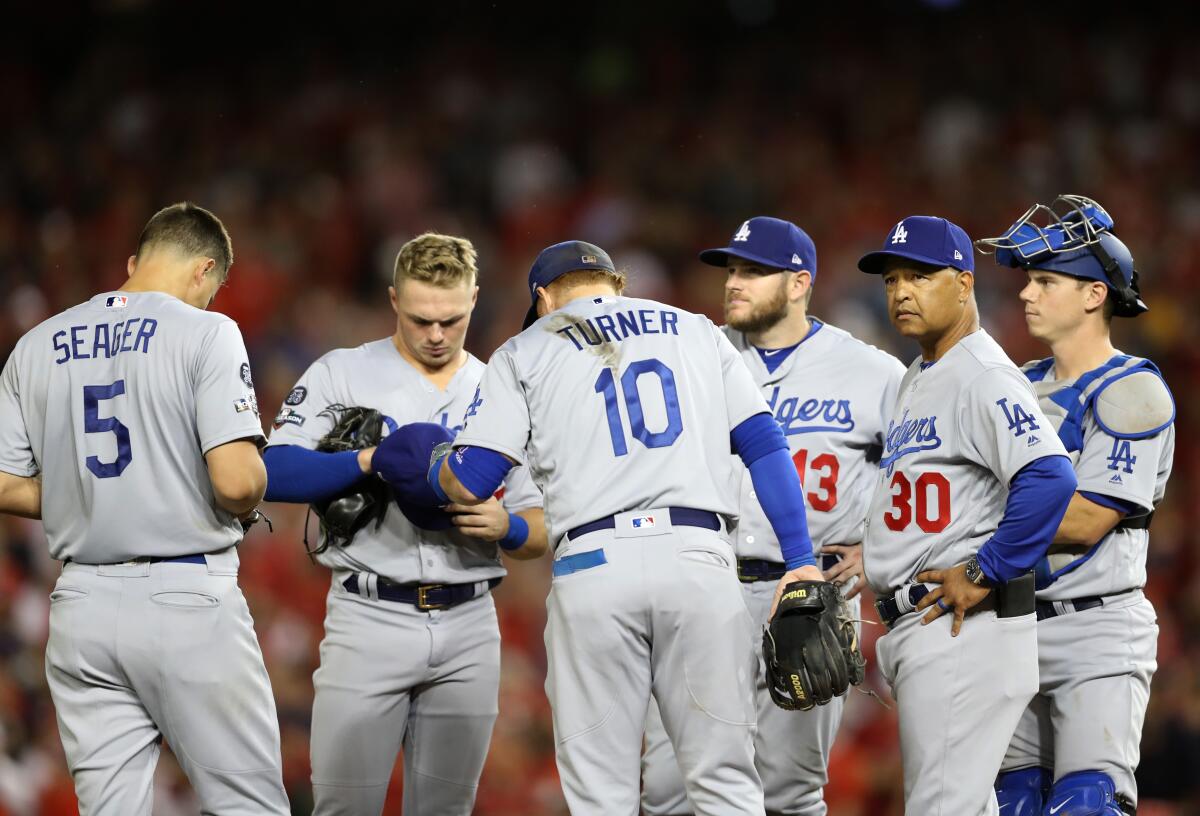
- Share via
The stars at this year’s Dodgers alumni game spanned decades. Steve Garvey, Orel Hershiser, Davey Lopes, Fernando Valenzuela and Maury Wills were among the dozens of former players at Dodger Stadium on June 1 to celebrate the franchise’s deep history.
But it was impossible for Kenny Landreaux, a former Dodgers center fielder, and some of his peers to ignore a difference between the rosters for the nostalgic exhibition and the lineup the Dodgers fielded that night for their 59th game of the 2019 season: While the alumni game brimmed with African Americans, the Dodgers, the franchise that signed Jackie Robinson to break Major League Baseball’s color barrier in 1947 and remained the preferred destination for black American players for decades, did not have a single African American player on their roster.
“We were like, ‘Wow, man, it’s getting kind of scarce around here,’” Landreaux said.
That game was not an anomaly. For the first time since 1946, the season before Robinson debuted and altered the course of American history, an African American did not appear in a game for the Dodgers for an entire campaign. For Landreaux, it was startling and yet unsurprising.
“I noticed it even before,” Landreaux said at a recent charity golf tournament to benefit the Major League Baseball Youth Academy in Compton. “Even though they went down to zero blacks on the team, I remember when it was cut down to six, then five, then four, then three, then two. I just saw it keep going down, down, and down.”
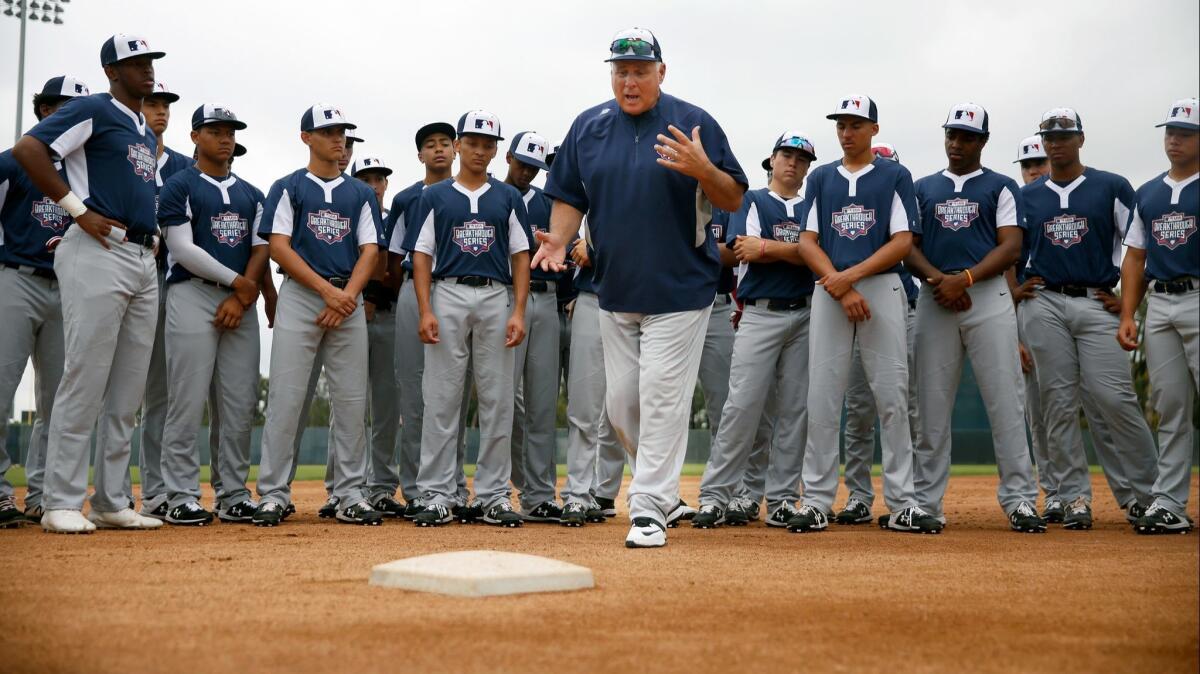
The dearth of African Americans on the Dodgers is just the latest example of an issue vexing a sport that has diversified in other ways, with an increasing presence of players from Latin America (many of whom are black) and Asia.
Of the 882 major leaguers on opening day rosters in 2019, 68 were African American, amounting to 7.7%. Eleven teams had no more than one African American. The Angels had four African American players last season: outfielders Justin Upton, Brian Goodwin and Michael Hermosillo and relief pitcher Keynan Middleton. Their top prospect, triple-A outfielder Jo Adell, also is African American.
The percentage of African American players peaked in 1981 at 18.7% and did not dip below 16 % until 1997, according to the Society of American Baseball Research. The 1989 All-Star game alone featured 15 African American players.
Free agent and former Dodgers starter Rich Hill, who will be 40 next season, had surgery to repair a tear in the ulnar collateral ligament of his left arm.
By 1993, Latin American players exceeded African American players. By 2017, 27.4% of major league players were Latin American. Meanwhile, the decline of African American players accelerated, hitting a low of 6.7% in 2013. About 70 percent of NFL players and about 75 percent of NBA players are African American.
Major League Baseball has spent the better part of this century combating the declining presence of black Americans in the sport. The effort has produced initiatives aimed at introducing baseball to children in underserved and diverse communities like Reviving Baseball in Inner Cities (RBI), keeping them invested in the game through their teenage years, and delivering the training and exposure necessary to play college and professional baseball.
MLB recently began tackling that final step with the annual Hank Aaron Invitational, a collaboration with the MLB Players’ Assn. and USA Baseball, established in 2015. The event, held in Historic Dodgertown in Vero Beach in July and August, is designed to place high school players in front of college and professional scouts.
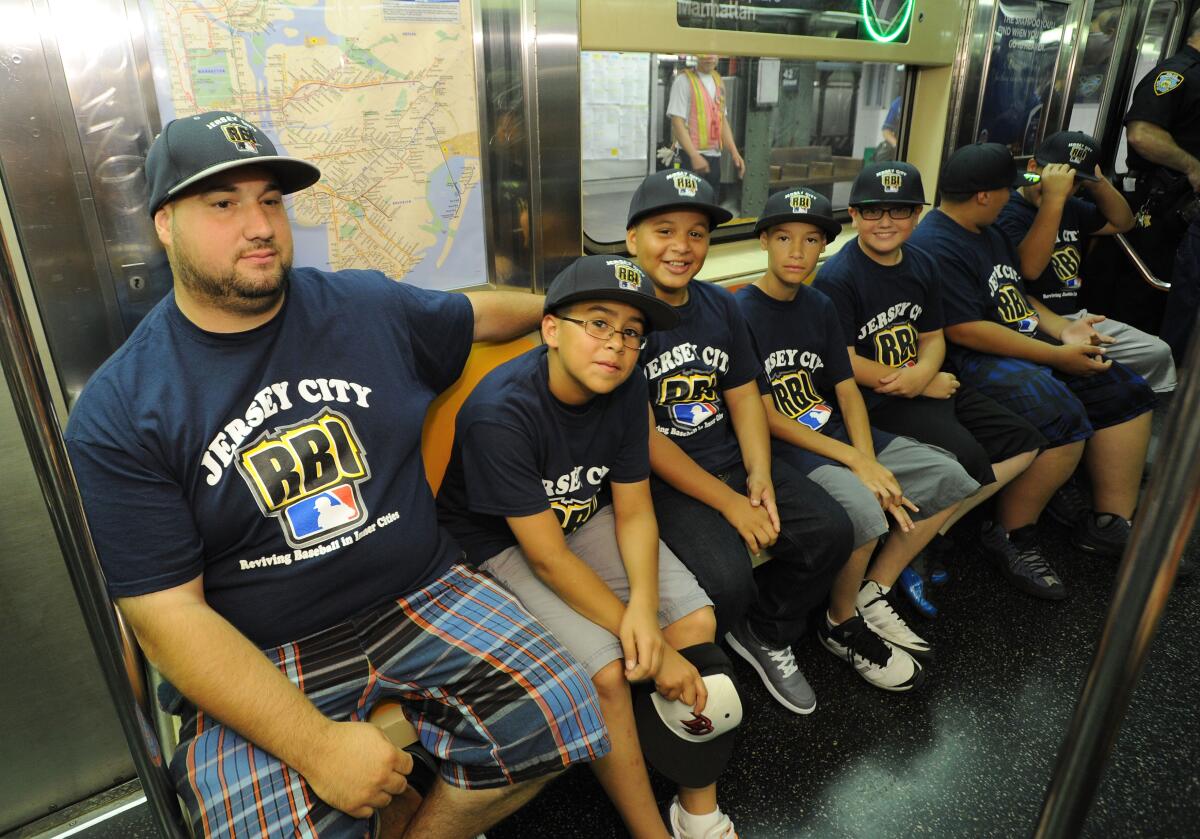
The league says 192 of the approximately 220 showcase participants who graduated from high school since 2016 are playing college or professional baseball. Alumni include right-handed pitcher Hunter Greene, a Sherman Oaks Notre Dame High School product and the second pick of the 2017 draft.
“I think this has been a longstanding challenge in baseball for as long as I’ve been a part of it,” Dodgers president of baseball operations Andrew Friedman said. “I know that there are a lot of people thinking about it and initiatives such as the RBI program are put in place to try to change it. Hopefully, we are making inroads, but, like most things, there’s probably more that we all can and should do.”
On other fronts, Friedman’s 2019 Dodgers reflected diversity. Dave Roberts was the only African American manager in the majors. Catcher Russell Martin is an African Canadian from Montreal. Closer Kenley Jansen is from Curacao. Pedro Baez and Yimi Garcia hail from the Dominican Republic. Julio Urias represents Mexico, Hyun-Jin Ryu arrived via South Korea, Kenta Maeda is from Japan, and Enrique Hernandez calls Puerto Rico home.
But the Dodgers went a complete season without an African American on their 40-man roster after outfielder Andrew Toles did not report to spring training due to a personal matter and was placed on the restricted list.
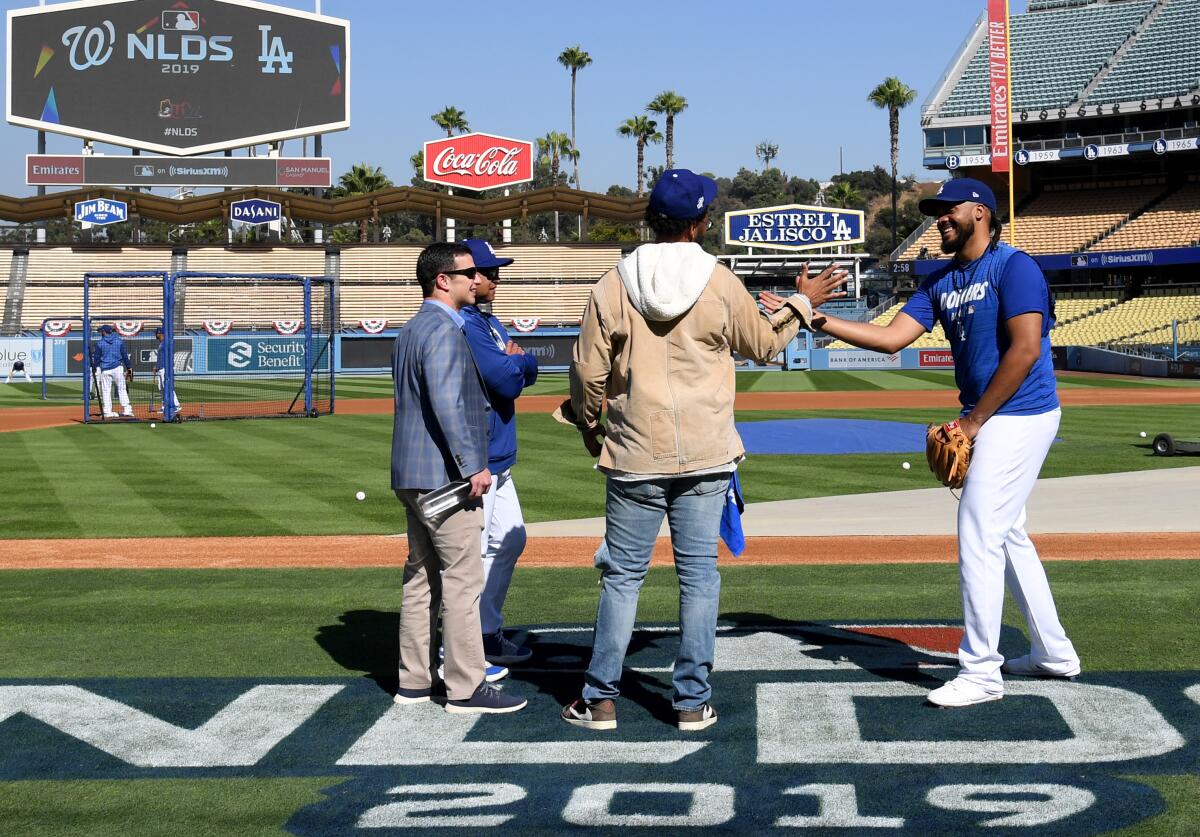
“When you hear that, when the legendary Jackie Robinson, the iconic figure goes through that particular system, it’s somewhat disheartening to hear,” said Jerry Manuel, a former major league player and manager who founded a charter school in Elverta, Calif., that teaches baseball to African American children.
Meanwhile, Landreaux has devoted time in his hometown. He was born and raised in Los Angeles, played the final seven of his 11 major league seasons with the Dodgers in the 1980s, and has been an instructor at the MLB Youth Academy in Compton since it opened in 2006.
The program serves players from tee ball to college. Landreaux said the talent dwindles at the high school level. He pointed out reasons for the dropoff; travel ball is costly, role models in baseball are scarce, and other sports are more appealing.
“I see times where we had players with enough talent to get to the professional ranks,” Landreaux said. “And for for some reason or another they just never get to the finish line.”
Dominic Smith was one of the teenagers under Landreaux’s guidance to reach baseball’s pinnacle. The New York Mets drafted the Gardena Serra High graduate 11th overall in 2013. He made his major league debut in 2017 and established himself in 2019 with an .881 on-base-plus-slugging percentage in 89 games. Smith, 24, began going to the academy in Compton when he was 12 and stayed until he was drafted.
Two former Houston Astros draft picks, now in the majors with other teams, say Major League Baseball should come down hard on the team if it has proof off clandestine sign stealing.
“They did so many good things in my life,” Smith said, “and I can give them all the credit for me making the major leagues.”
In 2017, Smith and two friends founded BaseballGenerations, an L.A.-based organization aimed to aid youth player development in Southern California. Workouts and clinics are held throughout the week. Major leaguers periodically visit. An all-star game for some of the top sophomores in California was recently held at St. Bernard High in Playa Del Rey.
It’s another effort to reverse a trend that even the Dodgers, the franchise of Jackie Robinson and Roy Campanella and Don Newcombe and Maury Wills and so many other African American stars from yesteryear, were not immune to.
“It should matter,” Landreaux said, “and I think it does matter.”
More to Read
Are you a true-blue fan?
Get our Dodgers Dugout newsletter for insights, news and much more.
You may occasionally receive promotional content from the Los Angeles Times.

